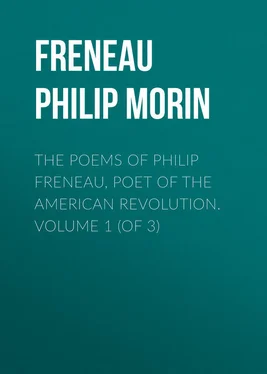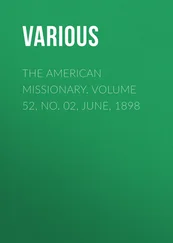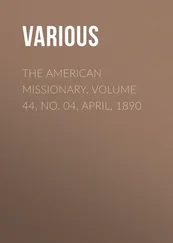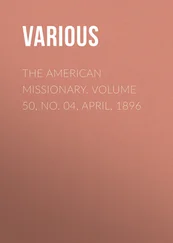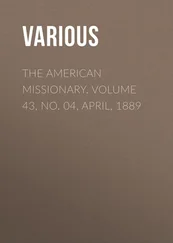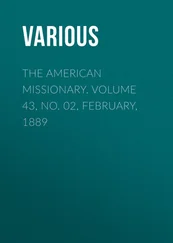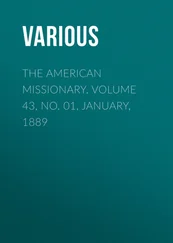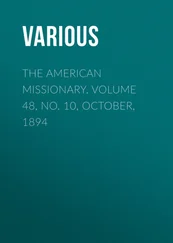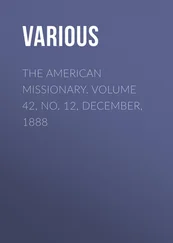Philip Freneau - The Poems of Philip Freneau, Poet of the American Revolution. Volume 1 (of 3)
Здесь есть возможность читать онлайн «Philip Freneau - The Poems of Philip Freneau, Poet of the American Revolution. Volume 1 (of 3)» — ознакомительный отрывок электронной книги совершенно бесплатно, а после прочтения отрывка купить полную версию. В некоторых случаях можно слушать аудио, скачать через торрент в формате fb2 и присутствует краткое содержание. Жанр: Поэзия, foreign_antique, foreign_prose, foreign_poetry, на английском языке. Описание произведения, (предисловие) а так же отзывы посетителей доступны на портале библиотеки ЛибКат.
- Название:The Poems of Philip Freneau, Poet of the American Revolution. Volume 1 (of 3)
- Автор:
- Жанр:
- Год:неизвестен
- ISBN:нет данных
- Рейтинг книги:4 / 5. Голосов: 1
-
Избранное:Добавить в избранное
- Отзывы:
-
Ваша оценка:
- 80
- 1
- 2
- 3
- 4
- 5
The Poems of Philip Freneau, Poet of the American Revolution. Volume 1 (of 3): краткое содержание, описание и аннотация
Предлагаем к чтению аннотацию, описание, краткое содержание или предисловие (зависит от того, что написал сам автор книги «The Poems of Philip Freneau, Poet of the American Revolution. Volume 1 (of 3)»). Если вы не нашли необходимую информацию о книге — напишите в комментариях, мы постараемся отыскать её.
The Poems of Philip Freneau, Poet of the American Revolution. Volume 1 (of 3) — читать онлайн ознакомительный отрывок
Ниже представлен текст книги, разбитый по страницам. Система сохранения места последней прочитанной страницы, позволяет с удобством читать онлайн бесплатно книгу «The Poems of Philip Freneau, Poet of the American Revolution. Volume 1 (of 3)», без необходимости каждый раз заново искать на чём Вы остановились. Поставьте закладку, и сможете в любой момент перейти на страницу, на которой закончили чтение.
Интервал:
Закладка:
"Father Bombo's | Pilgrimage to Mecca in Arabia. | Vol. II. | Wherein is given a true account of the innumerable and | surprizing adventures which befell him in the course of that | long and tedious Journey, | Till he once more returned safe to his native Land, as related | by his own mouth. | Written By B. H. and P. F. – 1770.
Mutato nomine
Fabula de te narratur — Hor.
Change but the name
The story's told of you.
MDVIILXX."
The adventures of the hero read like chapters from the "Arabian Nights." He has been for seven days a close captive on a French man-of-war, but he is rescued by an Irish privateer, only to be taken for a wizard and thrown overboard in a cask which is finally washed ashore on the north coast of Ireland. It would be useless to recount all of his adventures both afloat and ashore. He finally succeeds in reaching Mecca, and in returning safely home to America. The final chapter recounts the details of his death and moralizes on his life and character.
The work is crude and hasty. Whole chapters of it were evidently written at one sitting. The part signed H. B. is unquestionably the best; the prose is vigorous and the movement rapid. The only merit in Freneau's section lies in its lyric lament at the close of one of the chapters. The hero suddenly bursts into minor song, the opening stanzas of which are:
Sweet are the flow'rs that crown the Vale
And sweet the spicy breathing Gale
That murmurs o'er the hills:
See how the distant lowing throng
Thro' verdant pastures move along,
Or drink the Limpid Streams and crystal rills.
Ah see in yonder gloomy Grove
The Shepherd tells his tale of Love
And clasps the wanton fair:
While winds and trees and shades conspire
To fann with Love the Gentle Fire,
And banish every black and boding care.
But what has Love to do with me
Unknown ashore, distress'd by sea,
Now hast'ning to the Tomb:
Whilst here I rove, and pine and weep,
Sav'd from the fury of the deep
To find alas on shore a harder doom.
The nature of the undergraduate work done by Princeton in Freneau's time was thus summed up by President Witherspoon in his "Address to the Inhabitants of Jamaica," published in Philadelphia in 1772:
"In the first year they read Latin and Greek, with the Roman and Grecian antiquities, and Rhetoric. In the second, continuing the study of the languages, they learn a compleat system of Geography, with the use of the globes, the first principles of Philosophy, and the elements of mathematical knowledge. The third, though the languages are not wholly omitted, is chiefly employed in Mathematics and Natural Philosophy. And the senior year is employed in reading the higher classics, proceeding in the Mathematics and Natural Philosophy and going through a course of Moral Philosophy. In addition to these, the President gives lectures to the juniors and seniors, which consequently every Student hears twice over in his course, first, upon Chronology and History, and afterwards upon Composition and Criticism. He has also taught the French language last winter, and it will continue to be taught to all who desire to learn it. * * *
"As we have never yet been obliged to omit or alter it for want of scholars, there is a fixed Annual Commencement on the last Wednesday of September, when, after a variety of public exercises, always attended by a vast concourse of the politest company, from the different parts of this province and the cities of New York and Philadelphia. * * *"
Of Freneau's proficiency as a student we have no record. Of the details of the Commencement of September 25, 1771, when he received his degree, we have but a brief account. Brackenridge opened the exercises with a salutatory, and following came four other exercises which completed the morning's programme.
The audience assembled again at three, and after singing by the students there came:
"6. An English forensic dispute on this question, 'Does ancient poetry excel the modern?' Mr. Freneau, the respondent, his arguments in favor of the ancients were read. Mr. Williamson answered him and Mr. McKnight replied."
"7. A poem on 'The Rising Glory of America,' by Mr. Brackenridge, was received with great applause by the audience."
Madison on account of ill health did not appear.
The "Rising Glory" had been written conjointly by Brackenridge and Freneau. Although the former was given on the Commencement programme full credit for the exercise, it was surely Freneau who conceived the work and who gave it its strength and high literary value. Brackenridge in later years confessed to his son that "on his part it was a task of labor, while the verse of his associate flowed spontaneously." The poem was printed in Philadelphia the following year, and in 1786 Freneau isolated his own portion for publication in the first edition of his works.
This detaching of Freneau's portion from the complete work destroyed at the outset the original unity of the piece. The changes and omissions made necessary by the process of separating the part from the whole, the deliberate readjustment of perspective to bring the poem up to the historical conditions of the later date, and the careful editing which strove to remove blemishes and weaknesses due to inexperience, combine to make the 1786 version practically a new poem.
The first glimpse of Freneau after his graduation from Princeton is furnished by a letter to Madison, dated Somerset County, in Maryland, November 22, 1772: 3 3 Madison Papers, Vol. XIII. p. 9.
"If I am not wrongly informed by my memory, I have not seen you since last April, you may recollect I was then undertaking a School at Flatbush on Long Island. I did not enter upon the business it is certain and continued in it thirteen days – but – 'Long Island I have bid adieu, With all its bruitish, brainless crew. The youth of that detested place, Are void of reason and of grace. From Flushing hills to Flatbush plains, Deep ignorance unrivalld reigns.' I'm very poetical, but excuse it. 'Si fama non venit ad aures,' – if you have not heard the rumour of this story (which, by the by is told in various taverns and eating houses) you must allow me to be a little prolix with it. Those who employed me were some gentlemen of New York, some of them are bullies, some merchants, and others Scoundrels: They sent me eight children, the eldest of whom was 10 years. Some could read, others spell and a few stammer over a chapter of the Bible – these were my pupils and over these was I to preside. My salary moreover was £40, – there is something else relating to that I shall not at present mention – after I forsook them they proscribed me for four days and swore that if I was caught in New York they would either Trounce or Maim me: but I luckily escaped with my goods to Princetown – where I remained till commencement – so much for this affair.
"I have printed a poem in New York called the American Village, containing about 450 Lines, also a few short pieces added; I would send you one if I had a proper opportunity – the additional poems are – A Poem to the Nymph I never saw – The miserable Life of a Pedagogue – and Stanzas on an ancient Dutch house on Long Island – As to the main poem it is damned by all good and judicious judges – my name is in the title page, this is called vanity by some – but 'who so fond as youthful bards of fame?'
"I arrived at this Somerset Academy the 18th of October, and intend to remain here till next October. I am assistant to Mr. Brakenridge. This is the last time I shall enter into such a business; it worries me to death and by no means suits my 'giddy, wandring brain.' I would go over for the gown this time two years, but the old hag Necessity has got such a prodigious gripe of me that I fear I shall never be able to accomplish it. I believe if I cannot make this out I must turn quack, and indeed I am now reading Physic at my leisure hours, that is, when I am neither sleeping, hearing classes, or writing Poetry – for these three take up all my time.
Читать дальшеИнтервал:
Закладка:
Похожие книги на «The Poems of Philip Freneau, Poet of the American Revolution. Volume 1 (of 3)»
Представляем Вашему вниманию похожие книги на «The Poems of Philip Freneau, Poet of the American Revolution. Volume 1 (of 3)» списком для выбора. Мы отобрали схожую по названию и смыслу литературу в надежде предоставить читателям больше вариантов отыскать новые, интересные, ещё непрочитанные произведения.
Обсуждение, отзывы о книге «The Poems of Philip Freneau, Poet of the American Revolution. Volume 1 (of 3)» и просто собственные мнения читателей. Оставьте ваши комментарии, напишите, что Вы думаете о произведении, его смысле или главных героях. Укажите что конкретно понравилось, а что нет, и почему Вы так считаете.
